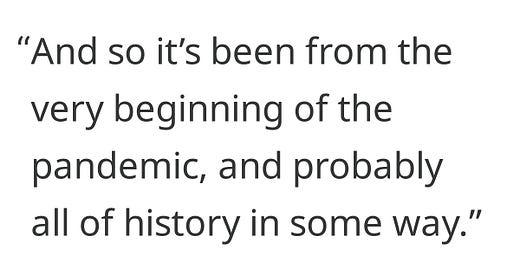The information zombies of pandemic misinformation.
There are things that have stuck with people from the beginning of the pandemic when we didn’t know much, and science & clinical information on covid was new, but we need to move with the times.
Occasionally I come across someone who repeats something from all those years ago, and I think oh yes, I remember when that speculation was floated. And at the time it was entirely reasonable speculation, but nothing came of it, so continuing to believe it and repeat it is misinformation now years later. But many people just accept it like it’s something “everybody knows” because people just keep repeating it. And if nobody brings it up and gets the updated information, they will have no idea that they’re laboring under outdated ideas.
It wasn’t unreasonable to trial medications like hydroxychloroquine, but it didn’t pan out, and one early study took years to get retracted even after a doctor was found to have acted improperly awhile back. Ivermectin didn’t pan out either. Vitamin D has been floated for ages as a cure for various things, and people warned about this, and yet it took 4 years for the science paper in support of Vitamin D for covid to get retracted even though the concerns were there all along. And of course to this day there are people promoting, and even prescribing, not just unproven stuff, but stuff that’s been pretty well disproven or harmful. The zombies continue to walk among us. And so it’s been from the very beginning of the pandemic, and probably all of history in some way.
UC Irvine School of Social Sciences - Why false claims about COVID-19 refuse to die - April 16, 2020 - Cailin O'Connor and James Own Weatherall, LPS, explain, courtesy of Nautilus There is a pandemic of misinformation about COVID-19 spreading on social media sites. Some of this misinformation takes well-understood forms: baseless rumors, intentional disinformation, and conspiracy theories. But much of it seems to have a different character. In recent months, claims with some scientific legitimacy have spread so far, so fast, that even if it later becomes clear they are false or unfounded, they cannot be laid to rest. Instead, they become information zombies, continuing to shamble on long after they should be dead. [emphasis added]
In December 2024 Alex Jones was yelling about bird flu supposedly being some kind of hoax scheme against Trump perpetrated by Peter Hotez. In October 2024, Alex Jones, he can be heard saying that he thinks Mahberg virus is a hoax because there was a false alarm on a German train. The Knowledge Fight podcast guys rightly point out that this was a case where the people involved and the authorities did the right things and it was fortunate that it wasn’t marburg virus but they were right to act as if it could've been - because it could’ve been - the person on the train was a medical student just back from working in a hospital in Rwanda. The precautionary principle is a workable strategy and a humane one.
The Knowledge Fight podcast hosts who cover Alex Jones (I wouldn’t watch Alex Jones myself, dear me) - for some reason felt mysteries on a train was a genre but then couldn’t think of any other train thriller movies other than “the big one” which I think they are talking about Murder on the Orient Express, but who could forget The Lady Vanishes? And there are many train thrillers, more than one Agatha Christie story involves a train, and more than one Hitchcock movie was set on a train too. I was thinking about the trains and I feel like the information zombie situation is almost like we get locked in on the train with the zombies. Has there been a train themed zombie movie? That I don’t know. But whatever’s on the train with us when we get on, that’s all we know if we’re not taking on new information passengers at any stops.
A year from now someone out there will believe that the medical student on the German train really did get Marburg Virus in Rwanda, because they’ll have never followed up their initial exposure to the story. And some, probably people who listen to Alex Jones, will believe it was a conspiracy.
Unfortunately this is a known problem called the primacy effect - that the first impression is huge and enduring, especially if combined with the halo effect, and that it’s very hard for people to let go of initial info. I remember in 2021 and 2022 there were people who thought there were still N95 shortages that were over by the end of 2020. In some cases situations I saw instances on social media where people got hostile with people over it as recently as 2022 or maybe later, accusing people using N95s of “taking them from healthcare workers” - even though not only was there no shortage of N95s, many healthcare workers are even now only allowed surgical masks and hospitals kept N95s from nurses long after there was no shortage. The same is true of Novavax, for which there has been a huge amount of misinformation, confusion, weird claims, and marketing hype, possibly due to people trying to make Novavax into a meme stock and some promising tidbits and also some misinformation stuck.
It’s important to stay current with things. But be careful about the source of information.


